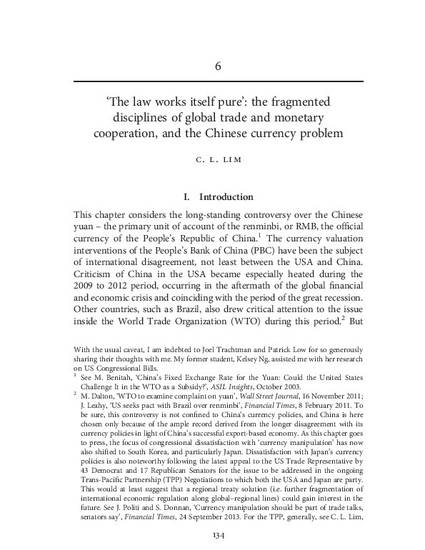
Contribution to Book
'The Law Works itself Pure': The Fragmented Disciplines of Global Trade and Monetary Cooperation, and the Chinese Currency Problem
International Economic Law after the Global Crisis
(2015)
Abstract
This chapter considers the long-standing controversy over the Chinese yuan – the primary unit of account of the renminbi, or RMB, the official currency of the People’s Republic of China. The currency valuation interventions of the People’s Bank of China (PBC) have been the subject of international disagreement, not least between the USA and China. Criticism of China in the USA became especially heated during the 2009 to 2012 period, occurring in the aftermath of the global financial and economic crisis and coinciding with the period of the great recession. Other countries, such as Brazil, also drew critical attention to the issue inside the World Trade Organization (WTO) during this period. But while the problem has arisen in the context of trade competition and was often framed as a trade dispute – in terms of ‘cheap goods’ or unlawful subsidization – a larger question concerns the extent to which the matter is adequately governed by existing rules under the post-Second World War Bretton Woods framework for the regulation of global trade and monetary cooperation. This chapter surveys and compares the rules and regimes for trade and monetary cooperation against the backdrop of persistent calls for unilateral action against Chinese goods, especially following the 2009 to 2010 period when China had intervened to maintain an undervalued yuan. Eventually, it also became a prominent electoral issue during the 2012 presidential elections in the United States. The central arguments in this chapter are that (1) the rules governing trade and monetary cooperation ‘tolerate’ a wide scope of discretion in currency policies; (2) under trade law, China’s trading partners are constrained by trade rules in the national responses they may wish to adopt, and that (3) the sort of national action in response to China’s currency policies which ought to be permitted is one which is justified by the kinds of rule arrangements we have. Without either counselling action against or attempting to defend China, this chapter argues that (4) of all the trade law arguments which are available against the backdrop of a fragmented international economic system, anti- dumping action is what global rules are most likely to permit. Framing the issue as a dumping issue, coupled with the prospect of WTO litigation, could also point a way forward for the future refinement of global rules. Particularly when we consider the legal methods lawyers use to work out such issues, fragmentation and the absence of adequate global rules do not mean a regulatory free-for-all, either for China, the USA, or anyone else.
Keywords
- renminbi,
- Chinese currency,
- WTO,
- international trade law
Disciplines
Publication Date
2015
Editor
C. L. Lim and Bryan Mercurio
Publisher
Cambridge University Press
Citation Information
Chin Leng Lim. "'The Law Works itself Pure': The Fragmented Disciplines of Global Trade and Monetary Cooperation, and the Chinese Currency Problem" International Economic Law after the Global Crisis (2015) Available at: http://works.bepress.com/chin_lim/39/
